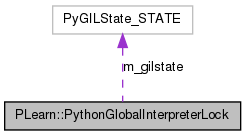|
PLearn 0.1
|
|
PLearn 0.1
|
Ensure thread safety by managing the Python Global Interpreter Lock. More...
#include <PythonObjectWrapper.h>

Public Member Functions | |
| PythonGlobalInterpreterLock () | |
| ~PythonGlobalInterpreterLock () | |
Public Attributes | |
| PyGILState_STATE | m_gilstate |
Ensure thread safety by managing the Python Global Interpreter Lock.
The Python interpreter is not fully reentrant and must be handled carefully in the presence of multi-threading. While this does not affect multi-threaded pure Python code (for which reentrancy is properly managed), it does affect extensions that are written in other languages. To this end, Python provides a Global Interpreter Lock (GIL) which must be acquired before calling any of its API within extension code and released afterwards.
This class provides a simple Resource-Acquisition-is-Initialization (RAII) idiom to manage the GIL. The idea is to construct a local variable of this class at the beginning of a scope which uses Python. The constructor acquires the lock, and the destructor automatically releases it. For example:
void foo() { // Acquire the Python lock. This blocks if another thread // already has the lock. PythonGlobalInterpreterLock gil; // Code which uses the Python C API comes here // ... } // Destructor releases the lock, so nothing to do.
Definition at line 772 of file PythonObjectWrapper.h.
| PLearn::PythonGlobalInterpreterLock::PythonGlobalInterpreterLock | ( | ) | [inline] |
Definition at line 775 of file PythonObjectWrapper.h.
: m_gilstate(PyGILState_Ensure()) { }
| PLearn::PythonGlobalInterpreterLock::~PythonGlobalInterpreterLock | ( | ) | [inline] |
Definition at line 779 of file PythonObjectWrapper.h.
References m_gilstate.
{
PyGILState_Release(m_gilstate);
}
| PyGILState_STATE PLearn::PythonGlobalInterpreterLock::m_gilstate |
Definition at line 784 of file PythonObjectWrapper.h.
Referenced by ~PythonGlobalInterpreterLock().
 1.7.4
1.7.4